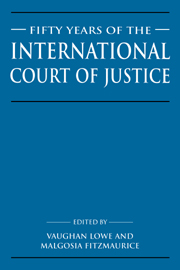Book contents
- Frontmatter
- Contents
- List of contributors
- Preface
- List of abbreviations
- Sir Robert Yewdall Jennings, by Vaughan Lowe
- List of publications of Sir Robert Jennings
- Table of cases
- Part I The International Court of Justice
- Part II The sources and evidences of international law
- 4 The International Court of Justice and the sources of international law
- 5 Municipal law reasoning in international law
- 6 Estoppel and acquiescence
- 7 L'Equité dans la jurisprudence de la Cour Internationale de Justice
- 8 The International Court of Justice and the law of treaties
- 9 International ‘soft law’: a contemporary assessment
- Part III Substance of international law
- Part IV Procedural aspects of the work of the International Court of Justice
- Part V The International Court of Justice and the United Nations
- Index
6 - Estoppel and acquiescence
Published online by Cambridge University Press: 02 November 2009
- Frontmatter
- Contents
- List of contributors
- Preface
- List of abbreviations
- Sir Robert Yewdall Jennings, by Vaughan Lowe
- List of publications of Sir Robert Jennings
- Table of cases
- Part I The International Court of Justice
- Part II The sources and evidences of international law
- 4 The International Court of Justice and the sources of international law
- 5 Municipal law reasoning in international law
- 6 Estoppel and acquiescence
- 7 L'Equité dans la jurisprudence de la Cour Internationale de Justice
- 8 The International Court of Justice and the law of treaties
- 9 International ‘soft law’: a contemporary assessment
- Part III Substance of international law
- Part IV Procedural aspects of the work of the International Court of Justice
- Part V The International Court of Justice and the United Nations
- Index
Summary
The concepts of estoppel and acquiescence are difficult to disentangle from other related concepts, such as recognition, admissions and recourse to subsequent conduct in the interpretation of a treaty. As one noted authority states when analysing the relevance of these concepts to the judicial determination of territorial disputes: ‘Recognition, acquiescence, admissions constituting a part of the evidence of sovereignty, and estoppel form an interrelated subject-matter, and it is far from easy to establish the points of distinction.’ Referring more particularly to the concept of estoppel, the same authority argues:
A considerable weight of authority supports the view that estoppel is a general principle of international law, resting on principles of good faith and consistency, and shorn of the technical features to be found in municipal law. Without dissenting from this as a general and preliminary proposition, it is necessary to point out that estoppel in municipal law is regarded with great caution, and that the ‘principle’ has no particular coherence in international law, its incidence and effects not being uniform. Thus before a tribunal the principle may operate to resolve ambiguities and as a principle of equity and justice: here it becomes a part of the evidence and judicial reasoning.
Practitioners in international law, particularly those who have been involved as counsel in long-standing territorial disputes, are aware that arguments founded on notions of estoppel and acquiescence figure prominently in the armoury of weapons at their disposal.
- Type
- Chapter
- Information
- Fifty Years of the International Court of JusticeEssays in Honour of Sir Robert Jennings, pp. 104 - 120Publisher: Cambridge University PressPrint publication year: 1996
- 9
- Cited by

